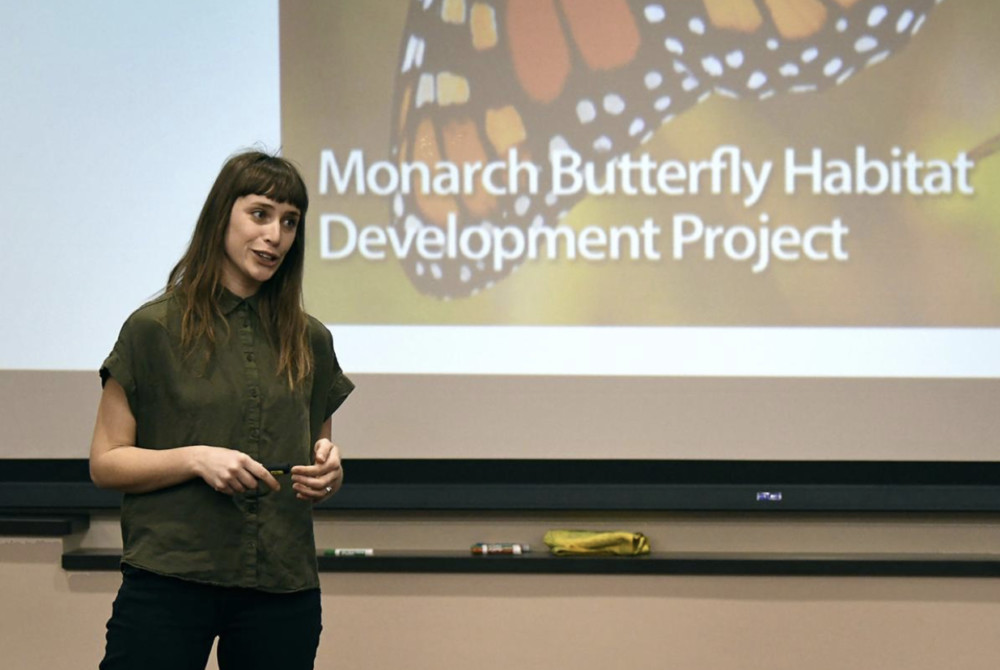By David Erickson
Ravalli Republic, Hamilton, Mont.
WWR Article Summary (tl;dr) Some very unique ideas were presented at this year’s John Ruffato Business Startup Challenge at the University of Montana. Teams went head to head for $50,000 in awards while also having the opportunity to network with venture capitalists, investment bankers and other successful entrepreneurs.
Montana
Alayna Rasile has an idea that would save monarch butterflies, cut down on petroleum products and plastic pollution while providing stylish warmth in winter weather.
She and her business partner Charlotte Sullivan want to make fashionable, eco-friendly milkweed-insulated coats.
“Milkweed is 10 percent warmer than down and the raw material costs one-fifth as much,” she explained in front of a crowd of judges on Friday.
Milkweed is a native plant that provides food for monarch butterflies and other pollinators. Due to habitat loss and other factors, monarch butterfly numbers are on the decline.
Rasile and Sullivan competed in the 30th annual John Ruffato Business Startup Challenge at the University of Montana’s College of Business.
College students from across Montana converge in Missoula to pitch their ideas and plans in front of business experts who provide them with valuable feedback, encouragement and questions.
Teams also complete for $50,000 in awards while also having the opportunity to network with venture capitalists, investment bankers, economic developers, corporate executives, early-stage investors and successful entrepreneurs. Past winners have gone on to start successful businesses in Missoula.
Rasile and Sullivan call their milkweed-based coats May West. Sullivan is an organic farmer who came to Rasile with the idea three years ago.
“I knew right away there’s something super special about this,” Rasile explained. “The silky fibers in milkweed are hollow so they have incredible heat retention like harvested goose down. But unlike goose down, the fibers are hydrophobic so they repel water and (are) hypoallergenic. It’s extremely lightweight and it’s a plant that grows natively in the United States.”
Rasile said the problem her company is tackling is that the outdoor apparel market uses synthetic, petroleum-based products or animal fibers.
“Textile technology has come a long way,” she said. “If you have a puffy coat it either has a goose down fill or a synthetic, petroleum-based fill. The problem with these is they’re constantly shedding microplastics into the environment both while we wear them and when we wash them. So Montanans alone shed almost 8,000 pounds of microplastics into wastewater every single day. And 35 percent of the microplastics in the ocean come from synthetic textiles.”
She said about 80 percent of goose down comes from “unethical” sources where birds are plucked live.
“The outdoor apparel market is $3 billion a year in the United States, and last year one in three people said that environmental and social responsibility are key deciding factors when they make purchases,” Rasile said. “And we realized there is a $1 billion section of this pie available for a sustainable, renewable alternative.”
Rasile said she and Sullivan hope to “scale up” the business so that there’s more demand for milkweed, thus encouraging people to grow more of it and lowering the price.
Just down the hall, Dominique Nault and Richard Mittens presented their idea called “Cultivated by Native Montana.”
Essentially, they want to construct an aquaponic food system on the Northern Cheyenne Reservation, and later on other reservations and in remote areas. They would grow fresh vegetables and traditional American Indian foods and sell them in bulk to local grocery stores, distributors and the Indian Health Service.
Mittens grew up on the Blackfeet Indian Reservation and Nault grew up on the Rocky Boy’s Indian Reservation. They both said these tribal areas are “food deserts” where it’s hard to get fresh veggies in the winter months without traveling long distances.
“We would sometimes have to go to Great Falls, which is over 100 miles on snowy roads,” Mittens said.
That leads to high obesity rates on reservations, because preserved and canned foods often contain high amounts of sugar and fat.
Nault also said climate change has shortened the season that she and her family can gather and preserve traditional foods like chokecherries and juneberries.
“It’s down to like a two-week window,” she said. “It used to be all of July and August.”
So, she’d like for the aquaponics greenhouse to grow those berries and make them available for a longer season.
“We want to help with food security,” she said.
They’ve already enlisted grant writers and lawyers who are willing to help them, so they hope to get going within the next year.
Morgan Slemberger, the assistant director for the Blackstone Launchpad at UM, helped organize this year’s event.
She said judges were impressed by all the pitches. Winners are announced late Friday, after the Missoulian’s Sunday business section press deadline. To view the winners when UM makes the announcements, visit https://www.umt.edu/startup/Business%20Startup%20Challenge/default.php.














































































































































































































































































































































































